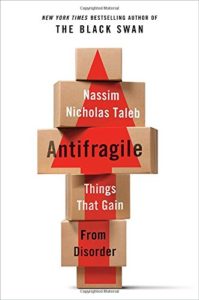Each month we like to round-up all of our book-related links. This month was short on finance-related books but long on everything else. You can also check out the previous edition of this linkfest, or our latest monthly (October) post of the most popular books among Abnormal Returns readers. Remember anything you buy from Amazon through these links goes to support the site. Enjoy!
Endorsement: Jack Bogle’s The Little Book of Common Sense Investing, now updated ten years later, is “one of my all-time favorite investing books.” (A Wealth of Common Sense)
Review: Keep reading Jason Calacanis’ Angel:How to Invest in Technology Startups, it gets better after the first few chapters. (value and opportunity)
Recommendation: Anti-Fragile: Things That Gain From Disorder by Nassim Taleb is one of Morgan Housel’s go-to books. (Safal Niveshak)
Notes: WTF?!: An Economic Tour of the Weird by Peter Leeson is a “very good book.” (Marginal Revolution)
Review: Jonathan Dee’s new novel The Locals is a ‘pitch perfect’ look at a hedge fund manager. (Institutional Investor) 0812993225
Notes: The Fate of Rome: Climate, Disease, & the End of an Empire by Kyle Harper may change your mind about the reasons behind the fall of Rome. (Marginal Revolution) 0691166838
Recommendation: Ben Horowitz’s The Hard Thing About Hard Things is “is one of my five favorite management books ever.” (Marginal Revolution)
Recommendation: The Second World Wars: How the First Global Conflict Was Fought and Won by Victor Davis Hansen is “Strongly recommended, a shoo-in for the top tier of the year’s best non-fiction list, the writing is gripping too.” (Marginal Revolution)
Review: Victor Davis Hanson’s The Second World Wars: How the First Global Conflict Was Fought and Won is “essential reading.” (WSJ)
Q&A: With Dan Buettner author of The Blue Zones of Happiness: Lessons from the World’s Happiest People or as he would have like to title it ‘A Lazy Person’s Guide to Happiness. (The Atlantic)
Review: Kieran Setiya in Midlife: A Philosophical Guide looks to help readers through the predictable “dip in life-satisfaction as one reaches middle age.” (WSJ)
List: The best books about failure including Being Wrong by Kathryn Schulz. (Tim Harford)
Coming soon: Andy Weir’s follow-up to The Martian, Artemis: A Novel is “is wildly entertaining and far-fetched, but stays surprisingly believable..” (Business Insider)
Winner: Amy Goldstein’s Janesville: An American Story won the 2017 Business Book of the Year Award. (Talking Biz News)
Q&A: With Eric Ries about The Startup Way a follow-up to the hugely influential The Lean Startup. (Wired)
Recommendation: Stalin: Waiting for Hitler, 1929-1941 by Stephen Kotkin is “definitely recommended.” (Marginal Revolution)
Review: Victor Davis Hanson’s The Second World Wars: How the First Global Conflict Was Fought and Won is “lively and provocative, full of the kind of novel perceptions that can make a familiar subject interesting again.” (NYTimes)
Review: Andy Weir’s new Artemis: A Novel “has revitalized the Lunar-colony scenario, with the author’s characteristic blend of engineering know-how and survival suspense.” (WSJ)
Q&A: With Richard Branson author of Finding My Virginity: The New Autobiography on why he doesn’t take himself too seriously. (Heleo)
Review: Ten Great Ideas about Chance by Persi Diaconis and Brian Skyrms is “a history book, a probability book, and a philosophy book.” (Reading the Markets)
Q&A: Noah Smith talks with Richard Florida author of The New Urban Crisis: How Our Cities are Increasing Inequality, Deepening Segregation, and Failing the Middle Class-and What We Can Do About It. (Bloomberg)
Recommendation: Hitting close to home, a look at John Hodgman’s new memoir Vacationland: True Stories from Painful Beaches. (kottke)
Don’t forget to check in with us on December 1st when we highlight the best-selling books on the site from November 2017.










